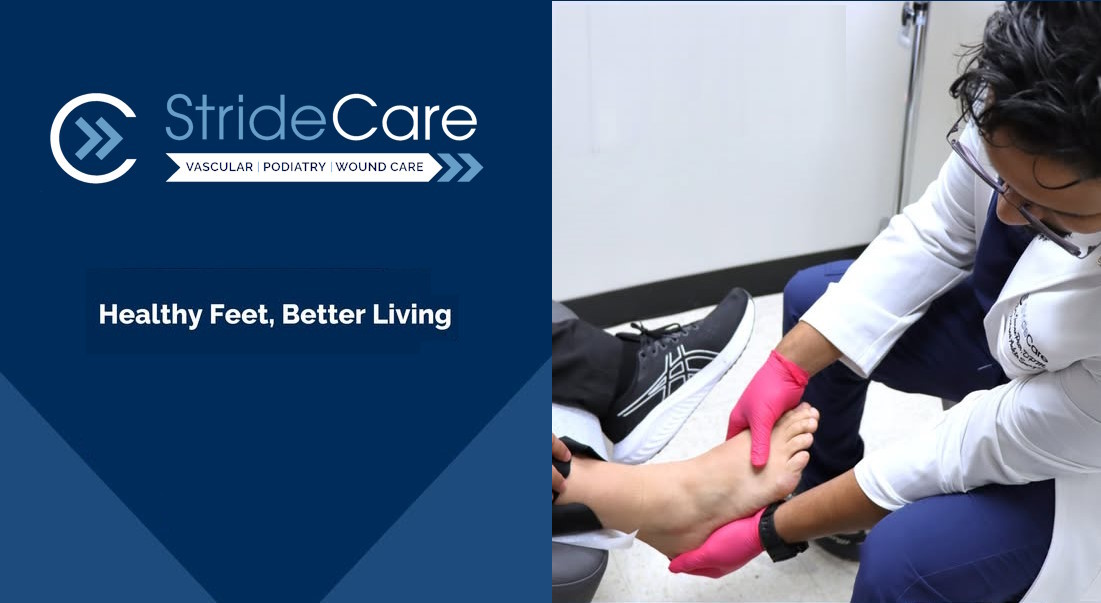Debunking 7 Myths About Your Podiatrist and Foot Care
Author: StrideCare Internal Team

Our feet can do amazing things and bear incredible weight with each step. The process appears so effortless at times, leading many of us to take for granted all the things we can do without putting much thought into it. That includes standing, walking, running, jumping, dancing, and simply enjoying life. However, our feet are not immune to injuries and other issues. Even those of us who take pride in good foot care can experience problems, and depending on severity, we may need to turn to a podiatrist for help. But how much can a podiatrist help with proper foot care, and is visiting one of these professionals necessary?
The quick answer is yes. Whether due to overuse, poor footwear, an injury, or underlying medical conditions, foot pain can go from a minor setback to something that significantly impacts your daily lives. Having a podiatrist in your corner to diagnose, treat, and prevent these and other foot problems makes getting back on your feet quicker, safer, and easier. However, many myths and misconceptions about podiatry keep people from seeking the care they need. At StrideCare, we believe it is time to set the record straight.
Concerned about your foot health?. Request an appointment with a StrideCare podiatrist today. Our collaborative approach ensures you receive the support you need for optimal foot care.
What Is Podiatry, and What Does a Podiatrist Do?
Podiatry is the branch of medicine dedicated to diagnosing and treating disorders of the foot, ankle, and lower extremities that make it hard to move or use your feet and ankles. As a result, our podiatrists at StrideCare study how bones, nerves, and muscles work together to help you move. They also have vast knowledge of illnesses beyond temporary issues and overall health.
Examples of both minor and complex problems a podiatrist can treat include:
- Diagnose issues related to your feet and ankles
- Order lab tests or imaging tests for proper diagnosis
- Prescribe medication
- Suggest and perform treatments ranging from conservative to surgical
- Prescribe medical devices and mobility aid devices
- Refer patients to a specialist when the foot issue may indicate an underlying vascular cause
Despite a podiatrist’s role in maintaining proper foot care, misinformation keeps some people from scheduling a visit. Whether due to outdated beliefs, word-of-mouth myths, or simple misunderstandings, these misconceptions can lead to unnecessary pain and long-term complications.

Dr. Imran Peer, DPM, at StrideCare Foot & Ankle in South Dallas
7 Myths About Your Podiatrist and Foot Health That Just Are Not True
Surprising as it may sound, some do not understand the podiatrist’s role and how important they can be in overcoming a variety of complex foot ailments. In fact, roughly 77% of Americans experience foot problems annually. While the severity of those foot problems can differ widely from person to person, only one-third seek help from their podiatrist or primary care physician.
Why? They do not think it is significant enough of an issue and genuinely believe the pain will go away with old-fashioned rest. While this may be true for some, it is not always true for others.
Here are seven myths and misconceptions about your podiatrist and other foot care needs:
Podiatry and Foot Care Myth #1: Foot pain is normal and will go away on its own
While occasional or short-term foot pain or discomfort will vanish on its own, especially if it is a simple matter of being on your feet all day, it is a mistake to think all foot pain is benign and will clear up on its own. If your foot pain is persistent, such as from an undiagnosed fracture, foot ulcer, bunion, heel pain, ankle sprain, or ingrown toenail, ignoring it and not visiting your podiatrist can lead to worse problems.

Podiatry and Foot Care Myth #2: Your podiatrist only treats minor foot problems
A podiatrist can do so much more than fit you for custom orthotics or suggest getting better footwear for your next marathon. They are a Doctor of Podiatric Medicine (DPM), also known as a podiatric physician or surgeon, qualified by their education and training to diagnose and treat conditions affecting the foot, ankle, and related structures of the leg. That means that from minor issues like calluses and ingrown toenails to more complex problems like fractures, diabetic foot ulcers, and performing surgical procedures, podiatrists are equipped to handle it all. Regular check-ups can prevent small problems from becoming bigger issues down the line.
Podiatry and Foot Care Myth #3: You only consult your podiatrist when foot pain strikes
Proactive foot care can keep you from having to deal with foot problems in the future, and your podiatrist can help with this. They can be a wonderful resource for many foot care questions or concerns, including advice on proper footwear and dos and don’ts (such as not walking barefoot and always washing your feet). Your podiatrist can also identify structural problems and early signs of bunions, nerve damage, hammertoes, and diabetic foot complications that you likely did not realize were there.
Foot care is essential for people of all ages. If you want to discuss your options, schedule an appointment with StrideCare’s expert podiatric physicians.
Podiatry and Foot Care Myth #4: Only older people and athletes need to worry about foot health
Foot problems do increase with age. Athletes of all ages and professional pursuits are also prone to foot and ankle problems the longer they compete. That said, foot problems can happen at any age and to anyone. For example. children and adults can develop problems due to flat feet. Additionally, waiters, retail workers, and medical professionals who stand for long hours can develop debilitating arch pain, heel pain, bunions, and more. Even lifestyle factors play a role in foot care, including poor shoe choices, obesity, diabetes, and genetic foot structure.

Podiatry and Foot Care Myth #5: Over-the-counter insoles work the same as custom orthotics
Not true. Shoe inserts are a general term for any additional support or cushioning for your shoes. For instance, you can buy more durable shoe inserts if you want extra cushioning as you train to run a marathon. These inserts come in various materials and types, including foam, gel, leather, and synthetic fibers. Orthotic insoles are custom-made to fit the unique shape of an individual’s foot or can come in pre-made forms that target common foot ailments. Your podiatrist may recommend orthotic insoles for improved foot alignment, pain relief, and even to prevent or alleviate issues associated with various medical conditions.
Podiatry and Foot Care Myth #6: Footwear does not affect foot health
Certain shoes that look and feel good as we leave the house are too tight or loose, unsupportive, and uncomfortable. This can lead to many complications, including plantar fasciitis, corns, calluses, and bunions. Therefore, your choice of footwear does matter. It is important that everyone wears shoes that provide proper support, cushioning, and adequate room for your toes.
Diabetics especially can benefit from proper footwear. Diabetes frequently leads to neuropathy, a condition that affects the nerves in the feet and reduces sensation. As a result, poorly fitting shoes can cause unnoticed injuries, increasing the risk of serious foot ulcers, infections, and, in severe cases, amputations. Diabetic shoes are designed not only for comfort but also for protection. They help prevent ulcers, reduce foot strain, and minimize the formation of calluses, promoting overall foot health.

Podiatry and Foot Care Myth #7: Your podiatrist cannot fix a broken toe
You may have heard that a podiatrist cannot fix a broken toe. The reality is that untreated broken toes could develop arthritis or deformities during the healing process if a podiatrist does not expertly manage them.
Your StrideCare Podiatrist Can Get You Back on Your Feet Again
Podiatrists are not consulted nearly enough when it comes to everyday foot pain. Perhaps you have suffered from debilitating heel pain for the past three months, or maybe you think you fractured your ankle at one point and have now developed arthritis. Living with this type of pain is not necessary. It can also make treatment and recovery more difficult. A podiatrist is a trained medical professional who understands every nuance of the ankles, feet, and toes and how they should work. All you have to do is schedule an appointment today.
StrideCare, the largest multi-specialty network in Texas, assists patients in improving their quality of life by treating a variety of common and complex conditions, such as diabetic vascular issues, peripheral arterial disease, venous insufficiency, foot neuropathy, varicose veins, diabetic foot ulcers, wounds, and many foot-related conditions. Consultations with a StrideCare podiatrist can help identify the type, severity, and location of foot problems, allowing our expert doctors and compassionate staff to provide the latest treatments and technologies for our patients’ benefit.
StrideCare is dedicated to providing caring patient care and support to help individuals reclaim their lives. With over 50 clinic locations throughout Texas, finding a StrideCare facility near you has never been easier. Each clinic is locally managed and Texas-based. To schedule a consultation, please contact us at 866-552-4866 or fill out our online appointment form.
This information is not a substitute for professional medical advice. Prior to starting any new treatment or questions regarding a medical condition, always seek the advice of your doctor or other qualified health provider.
StrideCare serves North Texas and South Texas communities, including South Dallas, Southlake, Stone Oak, Sugar Land, Sulphur Springs, The Woodlands, Waxahachie, Webster, Addison, Allen, Anna, Arlington, Austin, Carrollton, Celina, Clear Lake, Craig Ranch, Dallas, Euless, Flower Mound, Forney, Fort Worth, Frisco, Garland, Houston, Irving, Katy, Kaufman, Mansfield, McKinney, Mesquite, Midland, North Dallas, Odessa, Paris, Pecos, Plano, Prosper, Rockwall, Round Rock, Rowlett, Royce City, San Antonio, Sherman, and more.
*Patient names and/or photos may be changed to protect patient confidentiality.


